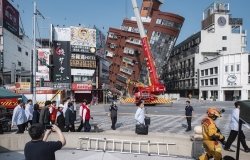Hong Kong as China's Test Bed for Economic and Political Development: A Failed Experiment?
Michael E. DeGolyer, Hong Kong Baptist University
Overview
At the time of its reunification with China in 1997, Hong Kong appeared to be the dynamic center of China's phenomenal growth. The seemingly unstoppable economic powerhouse floundered after the 1997 Asian Currency Crisis and recovered fully only after the mainland permitted millions of tourists to fill Hong Kong's coffers once more. To many, however, Hong Kong's "high degree of autonomy" appears to be an empty promise. In July 2003 an explosion of protest rocked Hong Kong with well over half a million—from a population of only 6.9 million—filling the streets. The government crumbled, seeing over the next 24 months the resignations of four ministers and the early retirement of the Chief Executive himself.
At a July 6 seminar hosted by the Wilson Center's Asia Program, Michael E. DeGolyer of Hong Kong Baptist University examined the latest survey results on public opinion about Hong Kong's constitutional reform and the new Chief Executive Donald Tsang. The following morning, DeGolyer spoke to senior congressional staff on the same subject at a Capitol Hill breakfast meeting.
According to DeGolyer, two groups, students and labor, are most sensitive to political issues. Despite Beijing's unwillingness to allow the direct election of the Chief Executive in 2007, the majority of poll respondents still want the election to take place then or even earlier. In general, respondents are far more satisfied with the new Chief Executive than with his predecessor. DeGolyer argued that it was unusual for Beijing to offer the position to Donald Tsang, a civil servant who attends Catholic Church activities almost every day and was a loyal supporter of the pre-1997 Hong Kong administration. This reflected the central government's great concern about political instability in Hong Kong. By using competent Donald Tsang, Beijing attempts to weaken Hong Kong's demand for democratic election of the Chief Executive. DeGolyer mentioned three developmental models in China: 1) the state-driven model as practiced in Shanghai, 2) the Hong Kong–driven but Beijing-supervised model, as practiced in Shenzhen, and 3) Hong Kong's market-driven model. According to him, Hong Kong will maintain its economic prosperity despite competition from big coastal cities in the mainland.
For details, read two of DeGolyer's recent essays on public opinion. These two essays are posted on the Asia Program's main page.
Drafted by Gang Lin, Asia Program Associate
Robert M. Hathaway, Director, Asia Program
Ph: (202) 691-4020
Hosted By

Indo-Pacific Program
The Indo-Pacific Program promotes policy debate and intellectual discussions on US interests in the Asia-Pacific as well as political, economic, security, and social issues relating to the world’s most populous and economically dynamic region. Read more
Thank you for your interest in this event. Please send any feedback or questions to our Events staff.










